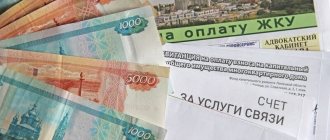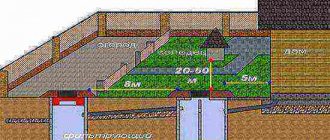| Not every construction organization has its own funds for the construction of an apartment building. The problem of financing construction, as a rule, is solved through lending or attracting funds from equity holders. | Articles on the topic: -Features of a construction contract -Construction contract: price and payment procedure |
Despite the fact that Federal Law No. 214 FZ [1] obliges the developer to provide guarantees to the equity holder, it is not possible to completely eliminate the bankruptcy of the developer. Due to the fact that in such cases it is mainly individuals who suffer who have fulfilled their monetary obligations to the developer, the legislator eventually introduced a special paragraph (§ 7 “Bankruptcy of Developers”) in Federal Law No. 127 FZ [2]. This article is devoted to the most significant features of bankruptcy cases for developers.
Where to start, how to file lawsuits correctly?
First of all, check whether bankruptcy proceedings have been initiated for the developer. According to the law of the Russian Federation, an announcement that an organization is declared financially insolvent must be published in the Kommersant newspaper - here you can check if your contractor is among the bankrupts using this link. You need to know the OGRN or INN of the company; they can be found in the shared construction agreement.
If the procedure has not yet started, you should submit an application to the Federal Tax Service or the “Fund for the Protection of the Rights of Citizens – Participants in Shared Construction”; these organizations will help you file a bankruptcy petition for the developer. Don’t delay: the sooner the proceedings begin, the better.
Developer bankruptcy procedure
When a company that promised to build, for example, a large apartment building and entered into an agreement with everyone who wants to have an apartment in this building, finds itself in a situation where it cannot fulfill its promises, all participants in the construction find themselves in a very difficult situation. The development company can no longer pay all the contractors, pay its creditors, and ultimately finish building the house. And all the construction participants who invested their funds cannot get their apartment. In this case, the requirement for bankruptcy proceedings for the developer is established by law.
Loan secured by PTS CashDrive, Person. No. 18-034-75-009039
from 0.05%
rate per day
up to 1 million
90 – 2,555 days
Take out a loan
This procedure can only be carried out in court, since it is a very complex process from a legal point of view. When construction participants who have invested their funds begin to file claims against the developer for failure to comply with their obligations, or the developer himself declares this situation, bankruptcy proceedings begin in court.
Typically, which process includes two basic functions:
- Observation: the court nominates its own expert, who monitors all the activities of the company for a certain amount of time and, based on the collected data, makes its verdict.
- Bankruptcy proceedings: after the expert has conducted observation and collected data sufficient to declare the developer bankrupt, the court officially declares the company bankrupt and appoints its manager, who from that moment on will manage all the company’s affairs and complete the procedure.
After this, the developer is officially declared bankrupt. This can be checked for each company in a special file.
Online loan Monetkin Monetkin, Lits. No. 20-030-46-009616
from 0.27% per day
First loan 0%
up to 100 thousand
14 - 168 days
Take out a loan
As judicial practice shows, declaring a developer bankrupt is a beneficial situation for all participants in construction. Since all of them have not observed the fulfillment of obligations to build their real estate for quite a long time, they have the opportunity to recover their invested funds through the courts or eventually receive ownership of their real estate.
If you choose money
You sign a waiver of the DDU and put forward a demand for reimbursement of invested funds and penalties for late completion of construction. Next, you wait for the end of the auction with the sale of the developer’s property - they can last up to 12-18 months - and receive your share of the money.
Please note that first the manager will pay money for causing harm to health and life, then he will pay off the bankrupt’s former employees, and only then he will compensate the shareholders for losses. If the amount is not enough to pay all participants in full, you will only receive part of the invested funds.
Who is considered a developer in a bankruptcy case?
In accordance with paragraphs. 1 clause 1 art. 201.1 of Federal Law No. 127-FZ, a developer in a bankruptcy case is a person who attracts funds and (or) property of construction participants (this can be any legal entity, including a housing construction cooperative, or an individual entrepreneur) to whom there are claims on the transfer of residential premises or monetary claims.
However, the features provided for by Federal Law No. 127-FZ on the bankruptcy of developers do not apply to any developer, but only to one that raised funds from citizens to finance the construction of an apartment building. Therefore, the type of construction project being built has legal significance. For example, the Presidium of the Supreme Arbitration Court, in Resolution No. 15636/13 dated July 15, 2014, did not extend the effect of Federal Law No. 127-FZ to houses of blocked development (townhouses), indicating that:
- sections in a blocked house are not residential premises in an apartment building (according to the agreement, citizens are given residential sections in a blocked residential building with a separate plot of land allocated for each section);
- participants in the construction of blocked houses are not construction participants for the purposes of applying the provisions of § 7 of Federal Law No. 127-FZ.
At the same time, it is not required that the person carrying out construction and raising funds is a developer in accordance with urban planning legislation, including that this person is the legal holder of the land plot on which the construction was carried out. The fact that a person attracts funds or property from construction participants is of significant importance, and not the existence of the right to a land plot or a construction permit. This, in particular, is stated in the decisions of the FAS North Caucasus Region dated April 16, 2014 in case No. A53-766/2013 and the FAS Central District dated October 29, 2013 in case No. A35-11561/2012.
Shareholders and banks: the manager of the developers spoke about his work
About who benefits from bankruptcy
The bankruptcy procedure is now definitely not beneficial to the debtor. In 2001, when I started as an arbitration manager, the bulk of the procedures were “tailored” to writing off the debtor’s obligations to creditors. But the legislation has changed a lot since then. The law, which was adopted in 2002, is fundamentally different from the law in its current version. In addition, judicial practice, reviews, decisions of plenums, information letters seriously influence legal regulation. One of the main innovations is subsidiary liability. If earlier cases of attraction to it were isolated, now the pendulum has swung in the other direction. The courts have begun to involve an order of magnitude more often, but they do not always do this with reason. I believe that over time, practice will find a middle ground in this matter.
About the bankruptcy situation of developers
In bankruptcy of developers the situation is much more complicated. The version of the bankruptcy law, which was in force until 2021, did not adequately protect the interests of shareholders, who often gave all their savings to an unscrupulous developer. The current provisions of the law allow the use of mechanisms to protect shareholders with the participation of the Fund for the Protection of the Rights of Citizens - Participants in Shared Construction. This helps to get out of a stalemate - to finish building houses or pay compensation. The claims of other creditors are satisfied at the expense of the debtor's bankruptcy estate, but most often it is possible to receive either a little or nothing at all. Developer bankruptcy has been undergoing constant reform over the past few years. Over the past three years, it has undergone changes that seem dramatic even against the backdrop of changing bankruptcy law in general.
Bankruptcy of developers is generally very difficult. Now I am the manager of seven developers, with a total number of shareholders of more than 8,000. These seven procedures take up 100% of my time, although with the same amount of labor I could handle 50-60 simple bankruptcies of companies. In addition, in the bankruptcy of developers, many non-legal issues have to be resolved, such as the continuation of construction and the organization of security of the construction site. There is usually not enough money for this, so you need to ask contractors for long deferments. There are many defrauded shareholders - this is a social aspect and additional control on the part of the regional administration; on many procedures, several meetings are held monthly with the governor.
About escrow accounts, which are mandatory from 2021
Escrow accounts are more of an economic story than a bankruptcy story (shareholders transfer payment for housing to escrow accounts, and the developer receives money only when the house is built). This method of payment improves the overall climate in the industry, but also affects the cost per square meter. After all, developers are forced to take out loans from banks, and the costs of this are ultimately passed on to the end consumer. The banks that lend to the developer, lend to the shareholder (mortgage) and keep the money in their accounts for a long time remain in a double or even triple win. This is a good income with minimal risks. At the same time, the transition to escrow accounts will significantly clear the market and reduce the number of unscrupulous developers and defrauded shareholders.
About the reasons for the bankruptcy of developers
I think the risks are the same with or without escrow accounts. From my experience, I highlight the following reasons: ineffective business strategy of the developer, deliberate theft of funds, sudden changes in market conditions (currency rate fluctuations, sharp drop in sales and other reasons). High compensation to shareholders in case of construction delays is also a risk. Especially if there are a lot of shareholders, and the simple period is long. This is an additional financial burden on the developer in the form of fines and penalties.
About banks in bankruptcy proceedings for developers
Banks are interested in returning funds using the collateral, but unfinished construction projects pledged by the bank are legally transferred to a new developer who completes construction. And here a conflict of interests of creditors arises. The fact is that the property is transferred by the bankruptcy trustee on the basis of a court ruling to the developer, which is established by the regional authorities. The consent of the mortgagee, that is, the bank, is not asked. This results in the risk of losing the collateral, and therefore the impossibility of meeting the bank’s demands. Currently, judicial practice on this issue is just being formed. The Supreme Court will most likely put an end to it, but when this will happen is unclear.
What you like and don't like about work
Being a manager for developers is hard work. A large amount of work, cooperation with government agencies, shareholders who find themselves in a difficult life situation. I like work that goes beyond the scope of law and requires solving complex problems in a short time. Indeed, in the bankruptcy of developers, it is necessary not only to take into account the interests of all creditors, but also to ensure the repayment of the claims of shareholders (as the most affected creditors) as quickly as possible. This can be difficult, because the law is being reformed, but there is no judicial practice. Therefore, we have to work in constant contact with the city administration and the Dom.RF Foundation in order to find non-trivial solutions to difficult situations and resolve administrative issues.
I don't like the legal uncertainty on a number of important issues. I understand that this is temporary, because changes to the law have been made recently. I hope that judicial practice will put everything in its place.
- Pravo.ru
Actions of equity holders in the event of bankruptcy of any developer
If the house is put into operation, the right of ownership should be recognized through the arbitration court, both for the apartment and for the parking space, storage room or other non-residential premises.
If the house has not been put into operation, then submit an application to the arbitration manager (temporary or bankruptcy) to include in the register of claims of construction participants the requirement to transfer an apartment or non-residential premises to you.
If the developer, before bankruptcy, did not transfer the apartment to you within the time period specified in the DDU, it is advisable to submit an application to the arbitration court to include the penalty in the specified register.
If the non-residential premises are not a parking space and have an area of more than seven square meters, then you are at risk. It is urgent to recognize ownership so that your property does not end up in the bankruptcy estate.
Application of additional interim measures
In accordance with paragraph 1 of Art. 201.3 of Federal Law No. 127-FZ in cases of bankruptcy of a developer, the following additional interim measures may be applied:
- a ban on the landlord concluding a lease agreement for a land plot with another person other than the developer, and a ban on state registration of such a lease agreement;
- prohibition on the lessor disposing of this land plot in any other way.
A necessary condition for their application is the provision of evidence of the presence of a construction project on the land plot or the start of construction of this project (clause 3 of the said article).
It should be noted that quite often the courts refuse to take interim measures. For example, in the Resolution of the Federal Antimonopoly Service of North Kazakhstan dated 09/05/2013 in case No. A32-20361/2009, the arbitrators refused to take interim measures, indicating that the disputed land plot had been seized, therefore, its alienation was not possible.
When considering a request for interim measures, the lessor of the land plot must be notified (Clause 2, Article 201.3 of Federal Law No. 127-FZ). Violation of this requirement is an unconditional basis for canceling a court decision on a request for interim measures, even if it was refused (Resolution of the Federal Antimonopoly Service of the Moscow Region dated March 20, 2012 in case No. A40-2469/11‑36‑12).
If interim measures are taken, the arbitration court is obliged to notify the Rosreestr unit at the location of the land plot about the ban on state registration of the lease agreement in relation to the specified land plot.
As a general rule, interim measures are valid until the date of completion of bankruptcy proceedings against the developer (Clause 4, Article 201.3 of Federal Law No. 127-FZ). However, there are two exceptions to this rule:
- interim measures are valid until the date the arbitration court issues a ruling to impose supervision, to refuse to accept an application, to return an application without consideration, or to terminate bankruptcy proceedings (clause 3 of Article 46 of the same law);
- at the request of the persons participating in the case, interim measures can be canceled ahead of schedule (clause 4 of the same article).
On recognition of ownership of real estate in the framework of a bankruptcy case of a developer
The house has been put into operation. Why apply for recognition of ownership rather than inclusion in the register?
The court's decision will allow the right to be registered in Rosreestr. The procedure for including your requirements in the register does not imply this possibility. Having a court decision in hand, you do not need to worry about any actions of the arbitration manager. After your rights are recognized in court, you become the owner and the actions of the bankruptcy trustee should not bother you. In addition, the new developer will not be able to blackmail you. They usually require an additional payment in exchange for agreeing to sign the transfer deed.
Can I recognize ownership in the event of bankruptcy of the developer if the house is put into operation, but the transfer deed has not been signed?
If the house is put into operation, we recognize the ownership of the apartment in any case, both with and without a deed. We have extensive judicial practice in various housing complexes in Moscow and the Moscow region, where developers have gone bankrupt. We have a well-developed technology for recognizing property rights for developers at the bankruptcy stage.
I have a signed document. Why recognize ownership if I can immediately submit documents to the MFC?
This should have been done before bankruptcy. After the bankruptcy of the developer, registrars do not want to take responsibility and refuse registration for any reason. Let's illustrate with the following example. The plot of the case: the apartment was transferred under a deed, the shareholder submits documents to the MFC to register ownership rights and receives a notice of suspension of state registration.
The registrar specifies the following reasons as grounds for suspension:
- a power of attorney was not provided under which the developer’s representative signed the apartment acceptance certificate;
- the powers of the person who signed the share participation agreement have been terminated;
- the registrar has doubts that the documents submitted for registration are authentic;
- registration of ownership of a real estate property after the introduction of bankruptcy proceedings against the developer may entail a violation of the rights and legitimate interests of third parties.
The matter has reached a dead end. It is useless to appeal the actions of the registrar, since the registrar acted in strict accordance with 218-FZ “On State Registration of Real Estate”. The only correct way out of the situation was to recognize the shareholder's ownership of the apartment in the Arbitration Court. The equity holder contacted us, and we solved the problem assigned to us.
When is it appropriate to recognize ownership? Immediately or when will legal practice appear on my house?
As part of the developer's bankruptcy case, the specific circumstances of the legal dispute are discussed. The houses are the same, but the circumstances of each claim are different. Cases on recognition of ownership of real estate are not considered automatically. The court is not a registration body and does not stamp decisions. In court, the shareholder will have to face a representative of the bankruptcy trustee. His task is exactly the opposite.
There is some good news. The first dozen decisions regarding any developer go through without complications. For several months after bankruptcy, no one comes to the courts on disputes with individuals on the part of the bankruptcy trustee. He needs to first get up to speed and deal first with legal entities. Thus, in order to recognize the ownership of real estate of shareholders, the first months after bankruptcy are the most appropriate time to consider any dispute.
It is easier to score balls into an empty goal when there is no goalkeeper (representative of the bankruptcy trustee) in it. Then his lawyers will begin to work on cases with individuals. They will begin to put a spoke in the wheels of the shareholders. “There is no information about payment for the contract”, “the signature on the contract is forged”, “a power of attorney was not issued to the person who signed the DDU”, “the power of attorney to the person who signed the transfer deed did not contain such powers” and more. So, the sooner the equity holder goes to court, the better.
The area of non-residential premises is more than seven square meters. What should a shareholder at risk do?
Changes made to the bankruptcy law on December 25, 2018. Only the following shareholders with non-residential premises are protected:
- with parking spaces without area restrictions;
- with any other non-residential premises with an area of less than seven square meters.
All other categories of shareholders must immediately recognize their property rights. Either for the share of unfinished construction, if the object has not been put into operation, or directly for the non-residential premises itself, if the house has been put into operation. If this is not done, the property will end up in the bankruptcy estate.









